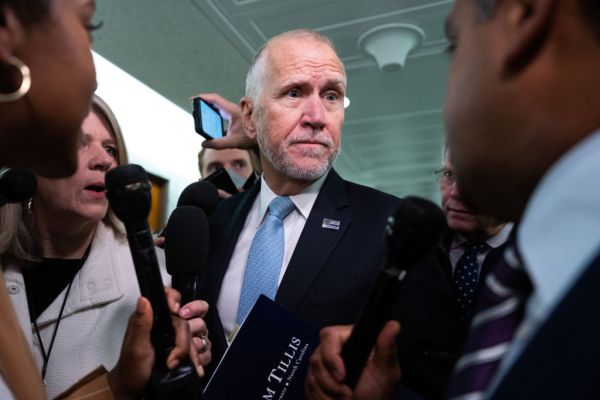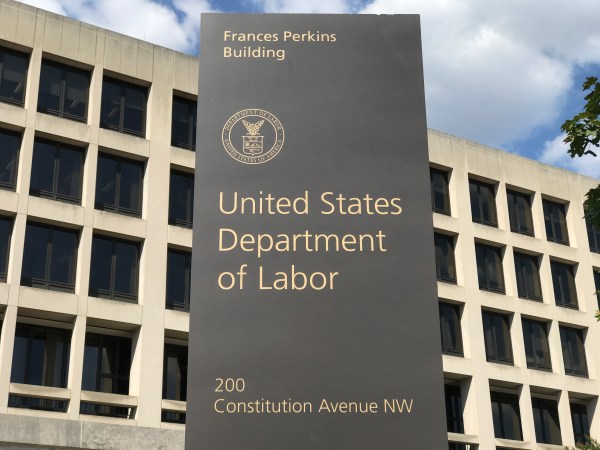Attention, Premium Members (and those of you on the fence about becoming premium members): We’re hosting our first Premium Town Hall on Tuesday, December 10, at 8 p.m. ET. This will be an excellent opportunity to interact directly with Dispatch founders and editors in an ask-me-anything style Zoom call. Ask our experts what they think of the cabinet nominations so far, what’s on the horizon in Congress, and how we’re sourcing up for a very different Washington.
We’ll send out more details in the coming days, including an RSVP link exclusively for premium members. If you’d like to join this special live town hall, be sure to join Dispatch Premium before next Tuesday!
We start with two questions, one easy and one hard. The easy one: Is it likely that Donald Trump’s administration will abuse federal power to harass antagonists like Liz Cheney and Mitt Romney?
You betcha. Romney has been candid about his anxiety at the prospect. The whole reason grifting children’s-book author Kash Patel has been tapped to lead the FBI, in fact, is his obsequious zeal for Trump’s “retribution” project.
Now, the hard one: What should be done about it?
On Wednesday, Politico reporter Jonathan Martin confirmed what others already assumed, that a “vigorous internal debate” has begun among Joe Biden’s senior aides over whether to issue pardons to MAGA enemies like Cheney, Sen.-elect Adam Schiff, and Dr. Anthony Fauci. The president himself supposedly hasn’t been looped in yet, preoccupied as he is with making sure that his sleazy son pays no price for the bona fide federal crimes he’s committed. But soon Biden will have a decision to make.
He could short-circuit the Trump Justice Department’s forthcoming jihad against Cheney by preemptively pardoning her for any federal crime she might have committed since—well, pick a year. Or he could keep the pardon in his pocket, not wanting to set a new norm of mass pardons for political allies, and dare Kash Patel to do his worst.
We Dispatchers are a norms-y bunch, and so the thought of Biden granting sweeping clemency to Trump critics various and sundry was received coolly among our staff. “The idea that presidents should be able to issue blanket pardons preemptively on the way out the door is some of the rankest dumbassery that has come down the pike in a long time,” Jonah Goldberg complained.
Sarah Isgur—who appears on Patel’s enemies list!—was likewise aghast: “Does nobody remember the whole debate we just had on presidential immunity?! We were told how dangerous any immunity would be! Even SCOTUS limited immunity to core official acts. So now [the] Biden team [is] doing blanket immunity—official and unofficial acts—for themselves?”
Not entirely for “themselves,” unless you consider Liz Cheney a member of the Biden administration. But the point stands.
Even so, Democrats from the White House to Congress to the New York Times op-ed page are warming up to a pardon-palooza before Biden exits. “This is no hypothetical threat,” Rep. Brendan Boyle of Pennsylvania warned of Patel’s revanchist crusade. “If we’re serious about stopping Trump’s authoritarian ambitions, we need to act decisively and use every tool at our disposal. Norms and traditions alone won’t stop him—Trump has shown time and again that he’s willing to ignore them to consolidate power and punish his opponents. The time for cautious restraint is over.”
Is he right? Is the time for cautious restraint over?
I lean instinctively toward Jonah’s and Sarah’s position but, I confess, I’m having trouble rationalizing doing so. People like Cheney and Romney defended America’s constitutional order at great cost to themselves and may be punished for it by a proto-fascist government. Democrats momentarily have the power to spare them from the ordeal. I’m to believe that the optimal outcome here is for them to stand by and do … nothing?
In an America that plainly no longer gives a rip about “norms”?
The case against pardons.
If, like me, you naturally recoil from the thought of Biden handing out pardons to political allies like candy on Halloween, there’s an obvious reason. By doing so, he’d be running the risk of immunizing people for crimes they’ve actually committed.
Sure, in theory he could limit his grant of clemency to certain types of conduct and not others. But if we’re worried about the DOJ trumping up charges (pun intended!) against Liz Cheney or Mitt Romney, realistically nothing short of a blanket pardon will do. For instance, if Biden were to pardon them only for acts related to their official duties as members of Congress, J. Edgar Patel’s FBI could simply shift its harassment campaign to their private conduct, starting with their income tax returns. You can’t protect MAGA’s nemeses from state intimidation unless you’re willing to protect them comprehensively.
But here’s the thing: What if they really are tax cheats?
The point of pardon-palooza is to shield the innocent from unjust prosecutions, not to shield the guilty from just ones. Yet if blanket pardons are the only way to thwart Trump, there’s no way to distinguish one group from the other. And the wider Biden casts his net in immunizing people, the more likely it becomes that some honest-to-goodness criminals will be let off the hook for offenses they’ve committed simply because they happen to have made an enemy of Trump.
Plus, think how it’ll look. A pardon, in the words of the Supreme Court, “carries an imputation of guilt and acceptance of a confession of it.” If you regard Liz Cheney and Mitt Romney as heroes for their political courage, the last thing you should want is to see their images tarnished by the perception that they’ve behaved so dubiously that an act of official clemency is needed to protect them from the consequences.
As Noah Rothman points out, it would amount to doing Trump’s and Patel’s dirty work for them. Instead of forcing the DOJ to go to the trouble of investigating, indicting, and trying the president’s enemies to impugn their character, with uncertain results at every step, the pardons would allow Trump to claim vindication in suspecting that Cheney and Romney were dirty all along. He’d use the fact of clemency to discredit them morally.
And precisely because he would, I suspect neither Cheney nor Romney would accept a pardon if Biden offered one. I certainly wouldn’t if I were them: They’ve risked too much to hold Trump accountable to forfeit the moral high ground now by agreeing to dubious executive action that will taint their reputations. A pardon, by definition, would imply that they have something to apologize for when they don’t. They should be proud of how they’ve faced the authoritarian threat while most conservative cowards around them have wilted.
Then there’s this: How would Biden decide who’s worthy of a pardon and who isn’t?
As you may have noticed, there’s no shortage of targets for the Trump “retribution” tour. If Cheney and Romney are obvious candidates for clemency, how about Adam Kinzinger? If Kinzinger is also a candidate, how about the other current and former Republican members of Congress who voted to impeach or convict Trump after January 6? If they’re candidates, how about the hundreds of Democrats in Congress at the time who also voted to do so? If they’re candidates too, how about the thousands of Trump critics in the media?
The point of the “retribution” tour isn’t to uncover and punish actual criminal malfeasance, it’s to soothe Trump’s grievances and delight the MAGA base by taking scalps from political enemies. And there are too many enemies out there to immunize all of them. If Biden places Cheney and Romney beyond the reach of Patel’s FBI, the agency could simply reach out and touch someone else.
There’s one more problem. Every novel presidential action creates a precedent and every precedent is one repetition away from becoming a “norm.” If you’re okay with Joe Biden tossing a warm blanket of criminal immunity over dozens or hundreds of political allies dating back years, how do you like the idea of Donald Trump doing it?
Because if Biden does it, you’d best believe Trump will do it before leaving office in 2029. The fact that Democrats have styled themselves as defenders of “norms” makes the precedent that much more irresistible for the GOP and its leader: Once establishment liberals have formally blessed politically motivated blanket pardons as fair game, any remaining taboo around the practice that might have deterred the insurgent right will collapse. (As will any remaining pretense Democrats make about being the party of “norms.”) Trump would be all but required by his base to exploit the precedent before his term ends lest he damage his reputation as a “fighter.”
So it’s settled. No blanket pardons for Cheney and Romney, right?
Well …
The case for pardons.
Some of the arguments I’ve laid out against pardon-palooza are facile and can be dismissed off the top.
For example, the fear that Biden might set a precedent that the new president will abuse is idiotic given that Trump has signaled his intentions to abuse the pardon power on behalf of cronies for years. He’s done it before; he’ll do it again; and given the legal jeopardy his co-conspirators faced for his “Stop the Steal” madness in 2020, he’s sure to make liberal use of blanket pardons before leaving office next time. Biden’s actions are completely irrelevant. Right-wing handwringing over “precedent” in this context stinks of trying to shift blame for Trump’s corruption to the Democrats.
The risk that a Liz Cheney or Mitt Romney will be tainted by receiving a pardon is also overblown. Traditionally, yes, accepting clemency has been seen as evidence of guilt. But Trump has spent most of this decade convincing the postliberal right that American justice is politicized and untrustworthy, decoupling moral culpability from criminal convictions. Meanwhile, Kash Patel’s enemies list and Trump’s endless burbling about “retribution” have convinced the liberal left that any investigations his DOJ undertakes of prominent critics will be presumptively corrupt.
Who’s left, then, that supposedly regards accepting a pardon as proof of guilt? Both parties now equate the other side’s prosecution of a political ally with persecution. Under those circumstances, clemency is an act of political grace to half the country, not evidence of culpability.
All of which brings us back to the beginning of this piece. I ask again: If Biden doesn’t protect Trump’s enemies by pardoning them preemptively, who will protect them?
“The bureaucrats will protect them,” you say. Maybe—at first. Certainly, there will be prosecutors and FBI agents who refuse to carry out unethical orders from the likes of Attorney General Pam Bondi and Kash Patel. But if there’s any goal to which the Trump administration is committed above all others (besides mass deportation), it’s purging the federal bureaucracy of deputies who’d dare tell their superiors “no.”
The story of the Republican Party since 2015 is that, for every Liz Cheney or Mitt Romney, there are a thousand ambitious, amoral connivers willing to say or do anything Trump wants to advance their careers. (Our new vice president is the ne plus ultra of the species.) He’ll eventually find someone at the DOJ willing to pursue harassment campaigns against his enemies. He won’t need to look hard, either.
“Fine,” you say, “then the courts will protect Cheney and Romney.” Is that so? That depends on which judge Liz Cheney or Mitt Romney happens to draw in their eventual criminal trial, no?
Trump-appointed judges acquitted themselves well during his first term, particularly during the “Stop the Steal” madness following the 2020 election, but his next crop of judicial nominees is likely to mirror the declining quality and ruthless postliberalism of his worst Cabinet nominees. In October, the Wall Street Journal reported on “a rising faction within the conservative legal movement [that’s] laying the groundwork for Donald Trump to appoint judges who prioritize loyalty to him and aggressively advocate for dismantling the federal government should he win a second term.” Which way are those loyalty-minded jurists likely to lean when one of Trump’s political enemies comes before them?
Frankly, to imagine that the courts will thwart Trump’s “retribution” campaign is to misunderstand how that campaign will operate. The goal won’t be to obtain criminal convictions; the goal will be to render the targets broke and miserable by forcing them to fight for their freedom in court. According to Politico, some of Joe Biden’s staffers “are already considering taking the best-paying jobs next year in part to ensure they have the resources to defend themselves against any investigations.” The process itself is the punishment, as Sarah put it. If Liz Cheney is acquitted after going bankrupt to defend herself from DOJ persecution, Trump will happily take that as a win.
“If all else fails, voters will protect Cheney and Romney by punishing Trump politically for harassing his critics,” you might say. To which I reply: No, my dude, they will not.
If most voters cared about Trump’s illiberalism, America wouldn’t have reelected a coup-plotter on the off chance that he’ll bring the price of eggs down by a quarter. And right-wing propagandists have worked energetically and successfully for years, following Trump’s “DARVO” playbook, to try to convince the public that he’s forever being victimized by corrupt accusers who have conspired against Real America. If Cheney or Romney ends up indicted, plenty of Americans who’ve absorbed MAGA’s attacks on them will regard the criminal charges credulously. And among those who are skeptical, most ultimately won’t care that they’re being railroaded. Are egg prices down or aren’t they?
No one’s coming to save Trump’s enemies from persecution—except, perhaps, Joe Biden. Why shouldn’t he?
False equivalence.
The obnoxious undercurrent that runs beneath right-wing opposition to a Biden pardon-palooza is the sense that it’d be unfair to exempt the likes of Liz Cheney and Mitt Romney from Republican “lawfare” after Trump was forced to endure it from Democrats. But of the four criminal cases brought against him, three were plainly meritorious and dealt with grave offenses—while the fourth, the actually trivial and political one in the bunch, nonetheless resulted in dozens of felony convictions.
Trump attempted the first presidential coup in American history, then left office with hundreds of sensitive documents which he had no right to take and which he actively concealed from the federal government despite many patient attempts to retrieve them without incident. Whether you believe he should have been indicted or not, that was real, consequential wrongdoing. The point of the “retribution” tour against the likes of Cheney and Romney is to punish them for right-doing: They offended populist Republicans not by trying to overthrow the government or absconding with classified information or cheating on their taxes but simply by insisting on holding Trump accountable to the Constitution for his authoritarian lousiness.
They did their civic duty. And now they must pay.
If you’re mortified by Team Biden’s interest in shielding right-doers for fear of how Trump might use the precedent to shield wrongdoers, you’re drawing a moral equivalence that greatly benefits the wrongdoers. Or, at the very least, you’re assuming that Americans can no longer differentiate morally between pardoning wrongdoers and right-doers, between clemency for the January 6 rioters and clemency for Liz Cheney, and so you’ve decided that a universal norm of not pardoning political allies is best.
And you know what? It probably is. If this year’s Republican presidential primary and general election results meant anything, it’s that lots of Americans can’t differentiate between right and wrong in politics anymore. It’d be a fitting, albeit depressing, benediction at the ongoing funeral of American exceptionalism to watch Liz Cheney not only lose her political career for opposing a coup plot but lose her life savings defending herself against frivolous criminal charges—all while the public shrugs.










Please note that we at The Dispatch hold ourselves, our work, and our commenters to a higher standard than other places on the internet. We welcome comments that foster genuine debate or discussion—including comments critical of us or our work—but responses that include ad hominem attacks on fellow Dispatch members or are intended to stoke fear and anger may be moderated.
With your membership, you only have the ability to comment on The Morning Dispatch articles. Consider upgrading to join the conversation everywhere.